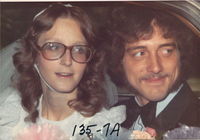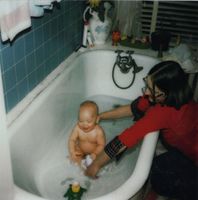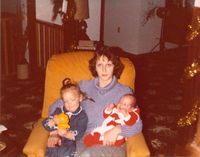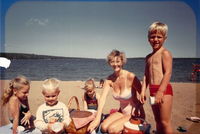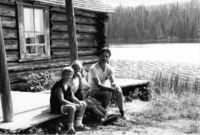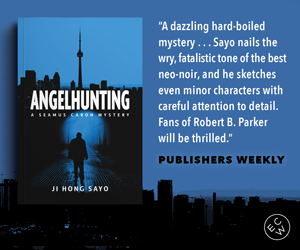A Story That No One Owns
By Brecken Hancock
I’m sure my point is only too plain… Lizzie is not dead, etc.—but there is a “mixture of fact & fiction,” and you have changed her letters. That is “infinite mischief,” I think…. One can use one’s life as material—one does, anyway—but these letters—aren’t you violating a trust? IF you were given permission—IF you hadn’t changed them… etc. But art just isn’t worth that much…. It’s not being “gentle” to use personal, tragic, anguished letters that way—it’s cruel.
…In general, I deplore the “confessional”—however, when you wrote LIFE STUDIES perhaps it was a necessary movement, and it helped make poetry more real, fresh and immediate. But now—ye gods—anything goes, and I am so sick of poems about the students’ mothers & fathers and sex-lives and so on. All that can be done—but at the same time one surely should have a feeling that one can trust the writer—not to distort, tell lies, etc.
—Elizabeth Bishop in a letter to Robert Lowell on the subject of his sonnet sequence “The Dolphin” prior to its publication, March 21, 1972, Words in Air: The Complete Correspondence Between Elizabeth Bishop and Robert Lowell
Those of us who reveal our personal stories to a public audience almost necessarily disclose sections of lives that do not belong to us. Narrative versions of our experiences in the world have supporting characters, victims, confidantes, villains. We mill the world around us for “a situation and a story”—two items Vivian Gornick names as crucial to the creation of functioning personal narrative. Gornick explains the artifice that must shape who is speaking and why that person is speaking:
The writing we call personal narrative is written by people who, in essence, are imagining only themselves: in relation to the subject at hand. The connection is an intimate one; in fact, it is critical. Out of the raw material of a writer’s own undisguised being a narrator is fashioned whose existence on the page is integral to the tale being told. This narrator becomes a persona… [T]he way the narrator—or the persona—sees things is, to the largest degree, the thing being seen. (Gornick)
The writer calls a world into being—and even a narrative universe drawn from truth becomes, in the writer’s hands, a fashioned one. Robert Lowell, in answering his dear friend, avows that he did not see the excerpted and altered letters of his ex-wife “as slander, but as sympathetic…. She is the poignance of the book, though that hardly makes it kinder to her.” There is a ruthlessness in his appropriation of his ex-wife’s words, but “the letters make the book,” Lowell justifies, “at least they make Lizzie real beyond my invention.”
I can’t defend Lowell and I certainly can’t answer Bishop’s concerns, which I think are humane and rational. However, I can identify with Lowell’s dilemma to some extent and I find that their conflict—a deeply compassionate debate between close friends—embodies an internal struggle I felt leading up to the publication of Broom Broom, and one I’ve continued to grapple with since the book appeared as a fully realized, public object.
My family, particularly my mother, father, and brother, appear as characters in the drama of my story, and while I love my family and feel a great deal of compassion and empathy—in real life—for their experiences, their struggles, the book and the tale it tells is mine alone. The narrator—the persona—in Broom Broom doesn’t lie, doesn’t deliberately alter or distort; however, the subjective nature of *my* experience of my mom’s illness constitutes the thing being seen. I imagined only myself in relation to the subject at hand.
I haven’t apologized to my family. The penultimate poem in the book is one meagre attempt to explain, if not justify, my brutal depiction of my mother. But my mother, herself, is gone. In her case, any apology I offer will be a hopeless dialogue with myself. On the other hand, my dad and brother are here, and I’m close with them, and when I consider their subjectivity in relation to “the subject at hand” I feel simultaneously proud and ashamed. Dad and Logan have always been supportive of my work and have often told me they feel I’ve expressed something in poems that they, too, experienced intimately, if wordlessly, before encountering the language of my grief.
But there’s no doubt that I’ve appropriated pieces of what we, in fact, share—a story that no one owns. I’ve told one version of a tale—necessarily a distortion. I do hope my family can forgive me, and the most optimistic part of me hopes that the emotional truths in the book transcend their crude rendering into form.
I must leave this now, open-ended, because I have no conclusion to offer here. For the situation and the story, see Broom Broom. But as a salve, I want to include a few family photos. There was beauty in my mother, in my childhood. That’s true too.
Next Post: "Modest portraits of my mother"
Previous Post: "His gravity"
Your CanLit News
Subscribe to Open Book’s newsletter to get local book events, literary content, writing tips, and more in your inbox
The views expressed in the Writer-in-Residence blogs are those held by the authors and do not necessarily reflect the views of Open Book: Toronto.
The views expressed in the Writer-in-Residence blogs are those held by the authors and do not necessarily reflect the views of Open Book.
Brecken Hancock's poetry, essays, interviews and reviews have appeared in Event, CV2, Grain, The Fiddlehead and Studies in Canadian Literature. She is Reviews Editor for Arc Poetry Magazine and Interviews Editor for Canadian Women in the Literary Arts. Her first book of poems, Broom Broom, was published by Coach House Books in 2014. She lives in Ottawa. Visit www.breckenhancock.com for more information.
